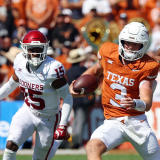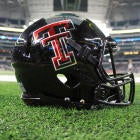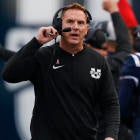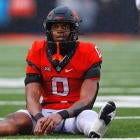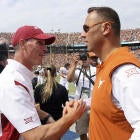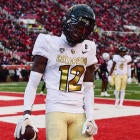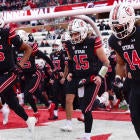Outside Texas Tech's Final Four hotel a couple of months ago, Matt Wells was coming from a meeting with one of the athletic department's biggest donors. It had to be mentioned: If he couldn't land a whale now, when exactly could he?
These are the best of athletic times for Texas Tech. It has never been in the national consciousness more than it is now. Men's basketball advanced to the national championship game. Baseball just made its fourth College World Series in the last six years. Men's track won the outdoor national championship.
Wells is drafting behind that momentum as the fresh, new football guy uttering football terms seldom heard in Lubbock, Texas.
You know, like, "physicality."
"It's unrealistic for the defense to go backwards all the time," Wells said that day on a patio at the Hilton Minneapolis.
He was speaking in general terms. But for the last couple of decades, that statement was a valid critique of Texas Tech football.
For all the scoreboard-breaking Air Raid exploits accomplished since the beginning of this century (when Mike Leach arrived), there has been a physical imbalance.
Before he calls a play a Tech, Wells has his orders after coming from Utah State: smack someone in the mouth.
"We're going to be physical," Wells said. "We're going to be thick, square, fundamentally sound, and we're going to stop the run."
This all makes football sense. It just doesn't have much history at Texas Tech. Leach tried to outscore people. No secret there. His offense was the after-hours speakeasy of college athletics: wide open and free wheeling.
It fit the West Texas vibe. All of it was taken to an extreme by Kliff Kingsbury. Six years as the coach of his alma mater, Kingsbury produced an NFL MVP (Patrick Mahomes) but only two winning seasons.
Kingsbury's teams were fun to watch, but the results were mostly ugly. His defenses were putrid, to put it politely, never finishing above 87th nationally. In the end, nobody expected to see Texas Tech's fired former coach at the NFL Draft picking Oklahoma's former center fielder (Kyle Murray) No. 1 overall.
That leaves Wells with a huge opening to drive though, but he's also glancing over his shoulder at that speak-easy legacy.
Be physical, it seems, but also fun.
Wells' Utah State teams were more complete than those at Texas Tech. That's essentially why he got the job. In his six seasons, the Aggies finished in the top three in Mountain West total defense four times.
TT athletic director Kirby Hocutt called his newly hired coach last December. The Aggies team that Wells left behind was eviscerating North Texas in the bowl game. In the first half alone of a 52-13 win, Utah State forced the Mean Green into three punts, three interceptions and knocked North Texas quarterback Mason Fine out of the game.
Hocutt was moved, dialing up Hocutt to tell him, "I want some of that."
"He said, 'Yes sir,'" Hocutt continued. "The way they played that day is what we want."
That sort of defensive reality, if it spread, would turn the Big 12 on its ear. Oklahoma went to the playoff last season allowing the most passing yards in the country. The league itself has had only one team (TCU in 2014 and 2017) finish in the top 15 in scoring defense over the last eight seasons.
Stuck in that one-dimensional rut, Texas Tech is 28-52 since firing Leach at the end of the 2009 season.
"The bottom line is we want to win," Hocutt said. "Obviously, we've got an offensive identity and brand. But you're only going to be successful as your defensive side of the ball."
Hocutt got a sniff of Wells' ability in 2013. That year, in Wells' first season, Utah State played USC off its feet in a 17-14 loss at the Coliseum. The Trojans linebackers coach that day was Mike Ekeler. He and Hocutt had played together at Kansas State.
"That was one of the more physical, challenging games I've been a part of," Ekeler told Hocutt. "I was jumping around in the locker room excited. People were looking around like we should beat Utah State."
The main message from Ekeler to Hocutt: "You need to keep your eye on this guy."
Because of physicality?
"Is that a word?," Hocutt countered. "This is a physical game that we play and you've got to, regardless of what your offensive identity is, be able to run the ball and stop the run on defense. You do that by being a tough football team. That aligns with Matt Wells.
"We want to be in a position in November. We want to be able to compete for a championship. We want to throw it around, but you can't be one dimensional."
So who is Matt Wells? To a lot of Texas Tech fans, not their first choice.
Dana Holgorsen (a former Leach assistant, now at Houston) was available. Wells is 45 and a Utah State alumnus who endured three straight losing seasons before going 11-2 in 2018.
"I really prayed for roadblocks to give me a reason not to go [to Texas Tech]," he said. "None of them came up. I was very happy. I've got so much sweat equity in Utah State."
Wells' offense was one of the more balanced in college football, running only 15 more times than it threw all season. While balance is what most offensive coordinators crave, the Texas Tech legacy haunts all those who follow Leach and Kingsbury.
Without saying it, Red Raiders fans are saying it: No matter what, you better be entertaining. Wells brought David Yost along as offensive coordinator. Remember him? The budding genius quit football altogether after the 2012 season at Missouri.
Wells took him on as offensive coordinator in 2017. Last season, Yost was a Broyles Award (best assistant coach) semifinalist. Utah State finished third in scoring.
Yost is 49, looks 29 and inherits quarterback Alan Bowman, who threw for 2,600 yards and 17 touchdowns in only seven starts.
The message of the Wells' makeover has more than been sent.
"We're not running perimeter stuff," Wells said. "Very rarely do we call a quarterback read. It's, 'Here is goes right now with a tight end and a running back and let's go.'"
Sitting on a patio outside the Hilton in April, Wells considered what would happen if basketball actually won that championship. They didn't, of course, but Wells saw a glimpse of what could be in football.
Chris Beard's Red Raiders strangled the country finishing third nationally in scoring defense. Beard laid down his own version of physicality in becoming national coach of the year before Wells could get the compliments out of his mouth.
"People don't understand more how they resemble a football team than they do a basketball team," Well said.
"They've done it by defense. They've done it by chemistry. They're intense, I'll tell you that."
A football crossover of sorts awaits in Lubbock.



